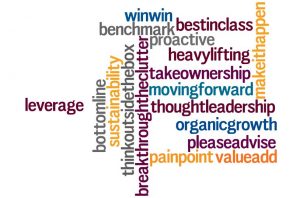 Have you ever been in an interview or meeting, thrown out a strategically placed buzz word, and then slowly watched the eyes of the person you’re speaking with glaze over? I definitely have. It’s not a good feeling, and it has taken some time to figure out exactly what I was doing wrong. In the name of research, I called upon a few associates for an hour of mock meetings. Notes were taken, one thing lead to another and we had a good list of “buzz words” that sound nice but don’t have any real meaning, and don’t describe or showcase professional talents.
Have you ever been in an interview or meeting, thrown out a strategically placed buzz word, and then slowly watched the eyes of the person you’re speaking with glaze over? I definitely have. It’s not a good feeling, and it has taken some time to figure out exactly what I was doing wrong. In the name of research, I called upon a few associates for an hour of mock meetings. Notes were taken, one thing lead to another and we had a good list of “buzz words” that sound nice but don’t have any real meaning, and don’t describe or showcase professional talents.
Before meeting with our clients, I prep candidates and make sure that they feel comfortable with speaking about their skills and experience relevant to the job. I also suggest that they stay away from the following phrases:
Value Add: What does this really mean? If you’re not adding value then why are you doing it? Does this mean that without the value add the service or deliverable you’re providing is lacking? By saying this you can find yourself tripping over words to justify what they actually mean, and you may be better off having not said it.
Win-Win: We all get what this means, but, to tell you the truth, it can imply the opposite. In a lot of cases it means that you weren’t able to find the best solution, but the solution that “pleased” everyone. Much of the time the “compromise” leaves much to be desired by all parties involved. Don’t use “win win” if you are trying to illustrate your leadership abilities, as sometimes leaders need to make the unpopular decision in order to progress.
Team Player: When I hear this, the thing that comes to mind is the gold standard for being a high performer who plays nice. But if you really want to know the truth, some of the most interesting ideas come from those who like to ruffle feathers and “challenge the status quo,” as Steve Jobs would say. You can definitely speak to your abilities to lead or execute in a group setting specifically. “Team player” can leave too much to the interviewer’s imagination when you could provide concrete examples of your professional excellence.
Think outside the box: When someone says to me that they “think outside the box,” it honestly leads me to believe that they aren’t as creative as they think. Where is this box in the first place? If you push boundaries, use creative problem solving or start from scratch wouldn’t you rather tell that story?
Heavy lifting: When someone says “Heavy lifting,” to me, it makes it sound like the work they do is very challenging or unpleasant. Supposedly it actually means the person behind the scenes who does all of the actual work, but why not talk about all of the leg work you do, or have done in the past? Spell out what the problem or challenge that you conquered is instead, because I know you’re not lifting weights while you’re sitting in front of me.
While there is an ocean of fun corporate phrases, please keep in mind that they don’t mean the same thing to every person and can kill a conversation in an instant. Instead of using ambiguous words, explain your credentials and experience with confidence, specific examples and a quality conversation. I know it’s not an easy task, as I have had to make several adjustments, but it has earned me a better relationship with people I deal with on a daily basis. Try it and see what happens!
 Author: Steve Stepniewski
Author: Steve Stepniewski

